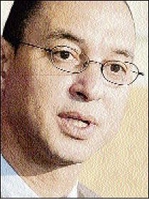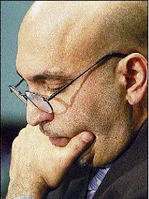Bruce's magicians ... and the role of government
Published: Sunday | October 11, 2009


(Left) Wehby ... no great success at Ministry of Finance and (Right)Zacca will need 'backative'. - File photos
Prime Minister Bruce Golding got some basics spot on in his pre-dawn address to Parliament and the nation on Wednesday, September 30.
I was fast asleep. But I have carefully read the script of the address.
Some, without adequate theological grounding, have called the prime minister's speech a 'Nicodemus' speech, meaning it was a late-night engagement. I truly hope it was a Nicodemus engagement in the proper sense that the counter-productive debate over the fine points of irrelevance has given way to a born-again experience. Jamaica, as a nation state, certainly needs a new birth experience.
Jesus bluntly asked the debating rabbi who came by night, "Are you the teacher of Israel, and do not know these things?" Like political Nicodemuses, our political leaders have not always displayed any keen understanding of the core business of government and of their role in it if the nation is to flourish in peace and order.
It was, therefore, most refreshing to see the prime minister's inclusion of an entire section labelled the 'Role of Government' in his Nicodemus speech. I have been harping on the point in my own media commentary that it is both absolutely essential and urgent to articulate the core role of government in simple, basic terms as the platform for purposive and effective governance especially under the tough constraining circumstances which face this country now. The prime minister has finally got around to doing it. And since most people would not have heard it live and direct or taken the trouble to read the text, that section of the speech is worth replicating here in full:
Role of government
"In the recent budget revision exercise, every minister and every permanent secretary was hard pressed to identify where cuts could be made. Cutting expenditure here will have this effect. Cutting expenditure there will have that effect.
"Governments are inclined to try to be all things to all people. Some of the things we do, we must do; some things we are pressured to do; other things we have chosen to do. The truth is that we cannot do all the things we try to do - not if we are to do well the things we must do.
"We will have to make some radical decisions as to what are the functions of government, what are people entitled to expect of their government.
We must, first of all, define and secure the core functions of government in relation to which our limited resources must be prioritised. I suggest that these are:
Providing a safe and secure environment
Effective and accessible justice system
Good-quality education system
Access to basic health care
Social welfare support for the disadvantaged and vulnerable
Public infrastructure and related services
A healthy environment
Efficient public bureaucracy
An appropriate policy environment and regulatory mechanisms
Effective diplomacy
"I am not suggesting these to be exclusive. What I am suggesting is that these are the core functions on which a stable society must be built.
These are the obligations we must assume and discharge before, over and above all else. And the structures and processes of government must be designed to ensure the discharge of these functions in the most efficient and cost-effective way."
I really have little to quarrel with. Some consolidation of points could come in well under 10 for better focus. Adam Smith in his enquiry into The Wealth of Nations got it down to three major areas of responsibility. A little resequencing of the list here and there, if the prime minister is listing by priority ... . But Golding's got it. We eagerly await the unveiling of the progressive agenda for critical comparisons.
What the prime minister and his administration are going to do with this vision of government is another matter. "It is not a matter of re-inventing government," the prime minister said. "It is a matter of restructuring government to be definitive in what it is about, efficient in what it does, less of a burden to the country's taxpayers and a stepping stone, instead of a stumbling block, to growth and development. We are not starting from scratch."
He then indicated that "the Public Sector Modernisation Division of the Cabinet Office is a repository of numerous studies that have been done, many plans that have been designed. What must now be done is to proceed purposefully and determinedly to implement the changes that are long overdue."
One of those "numerous studies", which is back in vogue 17 years after it was done, is the 1992 Report by the Rex Nettleford-led Committee of Advisers on Government Structure to which I contributed as citizen. The report addressed "the crisis in governance" and, yes, "the role of Government".
existing statutory bodies
The Committee of Advisers was advised that over 300 statutory bodies and public sector entities existed but could identify with certainty only 114 of these. And for the majority of those identified by name, "the committee was unable to discover ... which were dormant and which active, what there functions are, much less any idea of their income, expenditure and assets." The country is tangled up in a mass of public-sector agencies and having to devote the second largest slice of the Budget, after debt servicing, to paying public servants.
Clearly, governance cannot be improved without untangling and strengthening the public service mechanisms through which the role of government must be discharged. The empowerment of permanent secretaries to lead in the Budget recasting exercise was a big step in the right direction.
I have been publicly noting the observed tendency in the Golding Government to appoint 'magicians' to get done the job that should be done by a professional, high-performance civil service. The latest may be the appointment of special adviser to the prime minister, Christopher Zacca.
Zacca "will provide high-level advice and support to the prime minister on the development and implementation of policies, strategies and key initiatives designed to support the achievement of national socio-economic objectives".
To get this mouthful of mush chewed, Zacca will need backative which must come from the same old weakened and sidelined public service, unless he plans to bring his own from the private sector. Another magician recruit, Don Wehby, without the Grace Kennedy high-performance machine behind him, was no great success at finance.
The CAGS Report called for a "client-centred, results-oriented" public service. A couple of years later, the Patterson administration launched the Citizen's Charter Programme to which I made substantial contributions including observing the operations of the British programme which we were modelling. Public agencies were to set and publicise standards, provide accurate and timely user information in plain language, provide courteous and helpful service giving value for money and providing redress when standards are not met.
"So often we have postponed what needs to be done, waiting for a more appropriate time ... . So often we have flinched because doing what is right and what is necessary may be unpopular and the next elections are never far away. But ... the future of our country will be ... determined not by how may elections we win but by what we have won ... . We must start with some basics". - Golding
Martin Henry is a communications consultant who may be reached at medhen@gmail.com or columns@gleanerjm.com.
